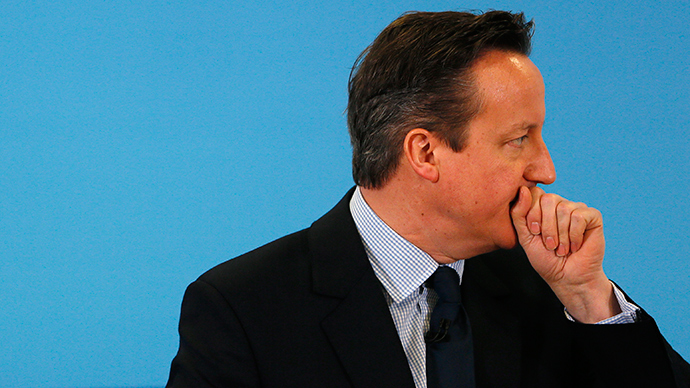Spies + defense: Cameron proposes budget merge to meet NATO goal

Prime Minister David Cameron has indicated the budgets for security services MI5, MI6 and GCHQ could be merged with military defense spending to ensure Britain continues to meet a key NATO spending target.
The PM is under pressure from outspoken British generals and the United States government to continue spending 2 percent of its GDP on national defense.
Speaking to LBC Radio, Cameron hit out at senior military figures who have expressed concern over Britain achieving this target, saying they are trying to promote their memoirs.
Cameron’s comments follow the publication of a report predicting Britain will spend 1.95 percent of its GDP on defense in 2015/16, just below the 2 percent NATO target.
Oliver Letwin, head of policy at Number 10, has been asked to consider what kinds of spending can be categorized by NATO as “defense” expenditure, an unnamed government figure said.
READ MORE: Govt deems security risks too low to ‘exempt defense from austerity,’ says think tank
“If we need to get to 2 percent of GDP, there is a question of whether you can increase overall spending by counting funding of the intelligence agencies as defense spending,” he told the Financial Times.
A second government official confirmed policymakers were examining what NATO defines as “defense spending,” and enquired whether member states can include different budgets to meet their targets.
One suggestion is to include the budgets for security services MI5, MI6 and GCHQ in defense spending.
Cameron told LBC Radio, “I have a responsibility to make sure we make the right decisions about defense and other security spending.
“I look at these things in the round, so I am also concerned about the budget for MI5, the Secret Intelligence Service, GCHQ, counter-terrorism policing. To me all of these things are part of our national defense.”
However senior politicians and generals criticized the plan.
Former Tory Defense Minister Sir Gerald Howarth said on Tuesday that “No amount of fancy footwork or creative accountancy is going to fool anybody. Adding the security budget to defense will not produce a single extra bullet or soldier.
READ MORE: Battle lines: Defense spending cuts could break the Tories
“It doesn’t address the fundamental problem that the UK and our allies face very real threats – a resurgent Russia, complete turmoil in the Middle East and many other threats around the world.
“If this idea goes ahead it will be seen by all for the gimmick that it is,” he said.
General Sir Peter Wall also expressed concern over the government’s planned defense budget cuts.
Writing in the Daily Telegraph on Tuesday, he said reduced military spending has led to the West being “caught napping” while new threats arise from Russia and the Islamic State (IS, formerly ISIS/ISIL).
The United States also weighed into the discussion, with US Army head General Ray Odierno saying he was “very concerned” by proposed defense budget cuts” earlier this month.
Cameron dismissed interventions from senior British military figures on Tuesday, suggesting they are trying to promote their memoirs.
“Obviously they have their own book to talk – sometimes quite literally a book to talk – and sometimes they just want to make their views known,” he told LBC Radio.
A report published by a military think tank on Monday predicts the UK will miss its NATO target for defense spending in 2015/16 by 0.05 percent.
READ MORE: ‘Very concerned’: Top US general attacks UK military spending cuts
The Royal United Services Institute (RUSI) also calculated two scenarios for future UK military spending: one optimistic and the other pessimistic.
In the optimistic scenario, the UK will prioritize defense alongside health and schools, a move that would see service personnel figures drop from 145,000 to 130,000 by 2020.
In the pessimistic version, service personnel figures would fall to 115,000 within five years.
RUSI predicts that even in the optimistic scenario, Britain’s defense spending will fall to around 1.75 percent of GDP by 2019.
NATO’s 2 percent of GDP defense spending target was adopted by member states in 2002.
But until now, only four countries have actually met the obligation: the USA, Estonia, Greece and Britain.
According to the German Institute for International and Security Affairs, Berlin refuses to increase its defense spending because it prefers to emphasize greater efficiency instead.












